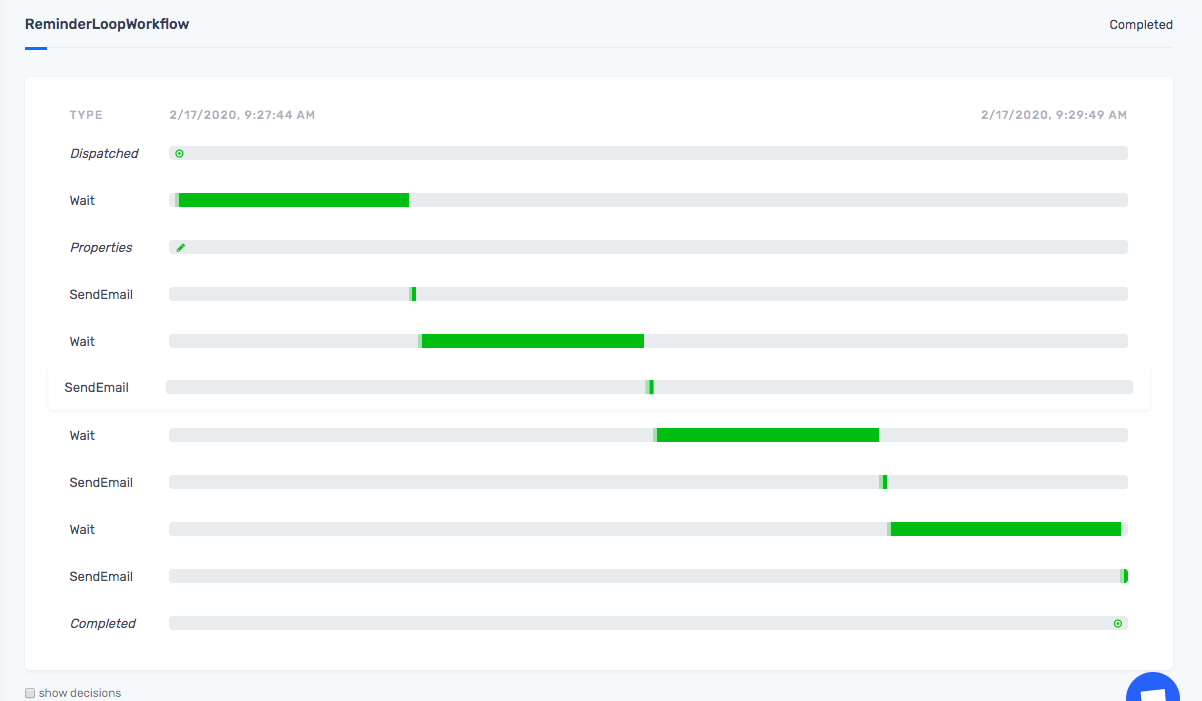This github project includes two workflows that make use of the Zenaton wait function to send automated email reminders to a user but in different ways.
Workflow 1: Automated emails to remind a user to do something
This workflow will wait for the user to do something inside an application such as upload a document or respond to a notification, etc and continue to send escalating reminders on a defined sequence if the user does not.
Workflow 2: Automated email sequence leading up to an Event
The workflow uses the wait until a date to send a sequence of emails (or it could be a text message) a specified time before an event. The event time could be updated in real time if it has changed.
To see a more complicated variant of this workflow see an example where we calculate the ETA of a deliver and send notifications as the time changes.
Workflow #1 Code:
module.exports.handle = function*({email, max_wait, nb_max_reminder}) {
let nb_reminder = 0;
let event = null;
do {
// Wait for the event EventA
event = yield this.wait.event("EventA").for(max_wait);
if(event === null) {
yield this.run.task("SendEmail", email, `ReminderA #${nb_reminder + 1}...`, "...");
}
nb_reminder++;
} while ((nb_reminder < nb_max_reminder) && event === null);
if(event) {
yield this.run.task("SendEmail", email, 'Congrats for EventA', "...");
}
// Reset the number of reminder
nb_reminder = 0;
do {
// Wait for the event EventB
event = yield this.wait.event("EventB").for(max_wait);
if(event === null) {
yield this.run.task("SendEmail", email, `ReminderB #${nb_reminder + 1}...`, "...");
}
nb_reminder++;
} while ((nb_reminder < nb_max_reminder) && event === null);
if(event) {
yield this.run.task("SendEmail", email, 'Congrats for EventB', "...");
}
};Workflow #2 Code:
module.exports.handle = function*({email, max_wait, nb_max_reminder}) {
let nb_reminder = 0;
let event = null;
do {
// Wait for the event EventA
event = yield this.wait.event("EventA").for(max_wait);
if(event === null) {
yield this.run.task("SendEmail", email, `ReminderA #${nb_reminder + 1}...`, "...");
}
nb_reminder++;
} while ((nb_reminder < nb_max_reminder) && event === null);
if(event) {
yield this.run.task("SendEmail", email, 'Congrats for EventA', "...");
}
// Reset the number of reminder
nb_reminder = 0;
do {
// Wait for the event EventB
event = yield this.wait.event("EventB").for(max_wait);
if(event === null) {
yield this.run.task("SendEmail", email, `ReminderB #${nb_reminder + 1}...`, "...");
}
nb_reminder++;
} while ((nb_reminder < nb_max_reminder) && event === null);
if(event) {
yield this.run.task("SendEmail", email, 'Congrats for EventB', "...");
}
};SendEmail Task
const sendGridApiToken = process.env.SENDGRID_API_KEY;
const fromEmail = "contact@your-company.com";
const axios = require('axios');
module.exports.handle = async function(email, subject, content) {
axios({
method: 'POST',
headers: {
'content-type': 'application/json',
'authorization': `Bearer ${sendGridApiToken}`,
},
url: 'https://api.sendgrid.com/v3/mail/send',
data: {
personalizations: [
{
to: [ {email: email} ],
subject: subject
}
],
content: [
{
type: "text/plain",
value: content
}
],
from: { email: fromEmail }
}
})
};Dashboard View of a Workflow Instance

Make it your own!
You can fork the project on github and deploy to heroku in a few clicks or download to your local environment to play with it. You can add more rules or steps and trigger actions in other services based on the workflow logic.
Sample Projects
Start building workflows
Sign-up and run a sample project Learn more
- Manage cookies
- Terms of Service
- © 2019, Zenaton. All Rights Reserved.